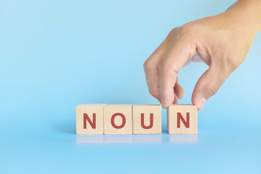: any member of a class of words that typically can be combined with determiners (see determiner sense b) to serve as the subject of a verb, can be interpreted as singular or plural, can be replaced with a pronoun, and refer to an entity, quality, state, action, or concept
There are two nouns in this sentence.
Love words? Need even more definitions?
Merriam-Webster unabridged














Share